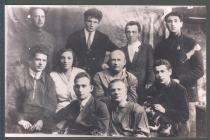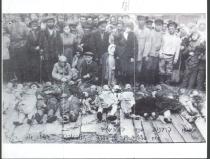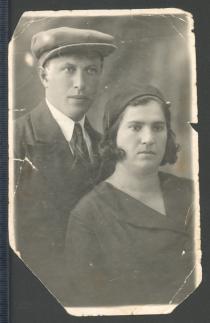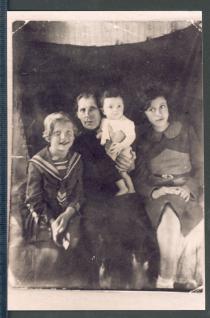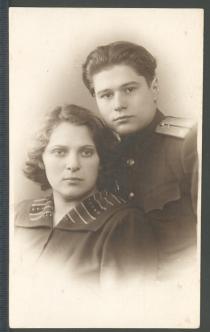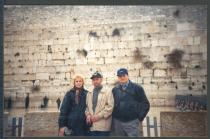This is may Grandmother Mea with me and my sisters, her grandchildren. I am sitting to the left in the sailor suit, and I'm 8 years old. My younger, year old sister Anya is being held in Grandmother'' arms. To the right is my elder sister Bronislava. Here she is already 12.
The picture was taken by the Chechersk photographer Portnov at our home. We are sitting on the sofa and behind us, tacked to the wall, is Grandmother's scarf. As the photographer said, "For background." This photo was done before the war, when Bronya and I were still schoolchildren. Grandmother Mera, after the pogrom in the village of Zagore in 1922 where her husband and youngest daughter Fira were killed, moved to Chechersk. She sold her house in Zagore and afterwards lived with us. . In our family no one liked to remember the tragedy they lived through, but I remember that in our house in Chechersk there never were any flowers. Grandmother couldn't look at them because at the time of the pogrom her flowers were sprayed with blood.
She was religious, but not orthodox. In Zagore she and Grandfather observed Jewish traditions, kept up a prayer chapel where the local Jewish community met. There were flowers from Palestine in the house. In Chechersk she went to synagogue, and followed Jewish traditions, but didn't demand this of Papa, who was a party worker. There was kosher food in the house, we baked matza, butchered the chickens at the shoikhet, but we also celebrated Soviet holidays (Mama and Papa). Of the religious holidays, we always celebrated Jewish Passover (Pesakh).
Grandmother was with us during the evacuation. After the war, when Mama was imprisoned, she lived in Chechersk with Anya (I was already studying in university). It was very difficult for her, but she never complained. . She always trusted only in her own hands, I don't remember her not working.
Grandmother was very kind, social and hospitable. There were always visitors in the house. Grandmother was loved by everyone. During the war the Germans burned the synagogue and afterwards it wasn't rebuilt. The Jewish community gathered at someone's house as a prayer chapel. My grandmother also attended the prayer chapel. When one of them died, they were buried according to Jewish tradition.
Grandmother died in 1956 and was buried in the Jewish cemetery in Chechersk. When my grandmother passed away Mama buried her in a grave, but observed all other traditions. How and what to do was explained to her and she followed them all (sat on the floor, didn't turn on lights, etc).
We, Grandmother's grandchildren, all obtained an education. I graduated from the Gertzen Leningrad Pedagogical Institute and was a geography teacher. I had, however, dreamed of becoming a literature teacher, but this was fated not to be as I was hindered by anti-Semitism: Jews can't teach Russian literature. This was in 1950. My husband was in the military. We have a daughter and two grandchildren. Bronislava graduated from the 1st Leningrad Medical Institute in 1951. She was a very good student and she was to be kept on for graduate study. However, this was the time of widespread anti-Semitism and she was turned away. The explanation for her being refused admission was given in a private conversation- nationality-Jewish. She was sent to Kazakhstan, to the city of Ust-Kammenogorsk, where she spent the rest of her life. She worked as a doctor-therapist, then as the assistant head of the department in the 1st City Hospital. Her older son works as a metallurgist in Ust-Kammenogorsk, at a lead-zinc factory, the same factory where Bronislava's husband worked as a metal worker/ assembler. Her younger son became an engineer-builder. Bronislava died in 1982 of cancer. In 1996 her younger son left with his family for Israel. My younger sister Anna graduated from the Leningrad Technical College of Light Industry. She was sent to Gomel, where she worked at the base, Oblsnab (regional supply). Her husband is a welder. Two children: her son graduated from the Gomel Agricultural Institute and works at the Gomel Agricultural Technology factory as an engineer of safety techniques. Her daughter is a dental technician.

